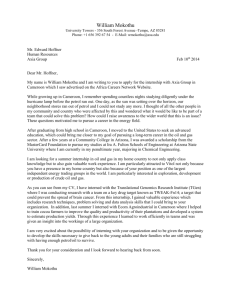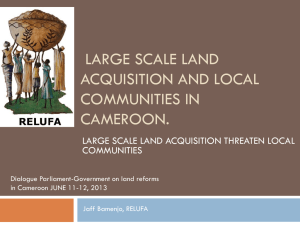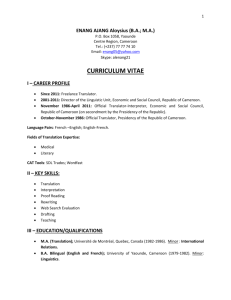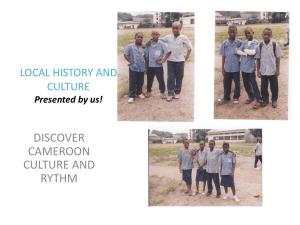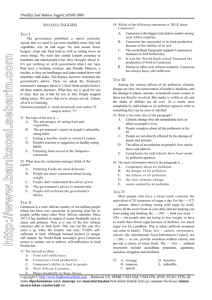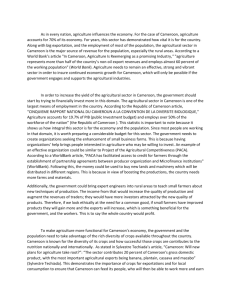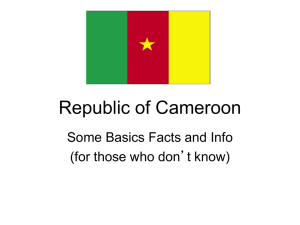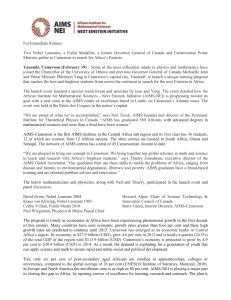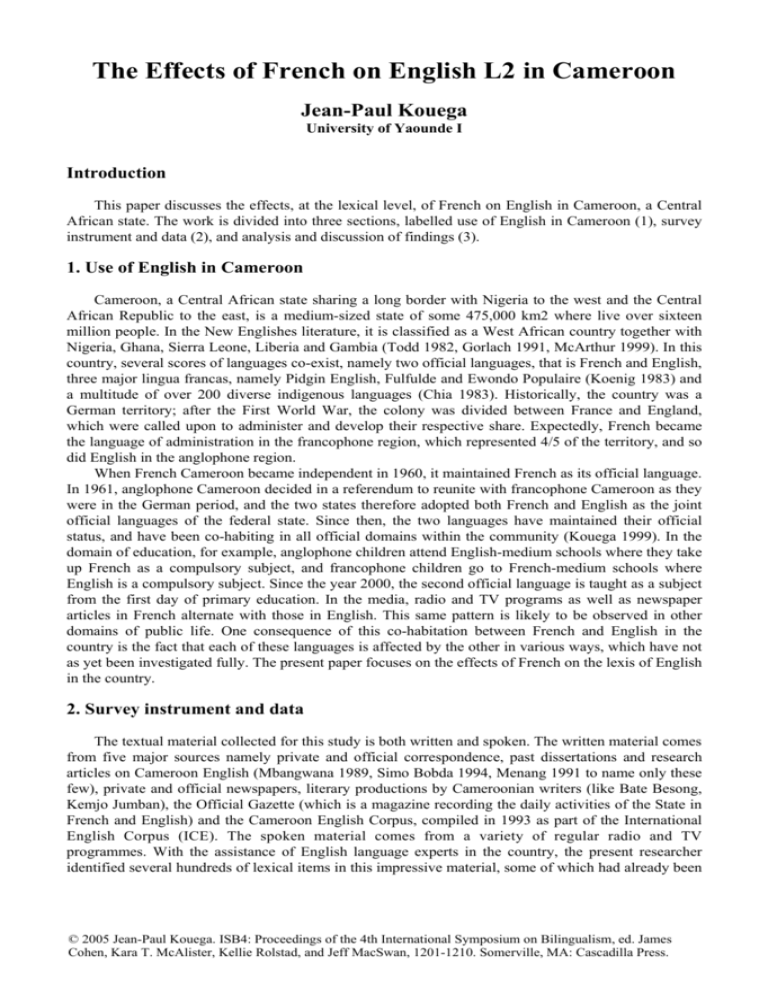
The Effects of French on English L2 in Cameroon
Jean-Paul Kouega
University of Yaounde I
Introduction
This paper discusses the effects, at the lexical level, of French on English in Cameroon, a Central
African state. The work is divided into three sections, labelled use of English in Cameroon (1), survey
instrument and data (2), and analysis and discussion of findings (3).
1. Use of English in Cameroon
Cameroon, a Central African state sharing a long border with Nigeria to the west and the Central
African Republic to the east, is a medium-sized state of some 475,000 km2 where live over sixteen
million people. In the New Englishes literature, it is classified as a West African country together with
Nigeria, Ghana, Sierra Leone, Liberia and Gambia (Todd 1982, Gorlach 1991, McArthur 1999). In this
country, several scores of languages co-exist, namely two official languages, that is French and English,
three major lingua francas, namely Pidgin English, Fulfulde and Ewondo Populaire (Koenig 1983) and
a multitude of over 200 diverse indigenous languages (Chia 1983). Historically, the country was a
German territory; after the First World War, the colony was divided between France and England,
which were called upon to administer and develop their respective share. Expectedly, French became
the language of administration in the francophone region, which represented 4/5 of the territory, and so
did English in the anglophone region.
When French Cameroon became independent in 1960, it maintained French as its official language.
In 1961, anglophone Cameroon decided in a referendum to reunite with francophone Cameroon as they
were in the German period, and the two states therefore adopted both French and English as the joint
official languages of the federal state. Since then, the two languages have maintained their official
status, and have been co-habiting in all official domains within the community (Kouega 1999). In the
domain of education, for example, anglophone children attend English-medium schools where they take
up French as a compulsory subject, and francophone children go to French-medium schools where
English is a compulsory subject. Since the year 2000, the second official language is taught as a subject
from the first day of primary education. In the media, radio and TV programs as well as newspaper
articles in French alternate with those in English. This same pattern is likely to be observed in other
domains of public life. One consequence of this co-habitation between French and English in the
country is the fact that each of these languages is affected by the other in various ways, which have not
as yet been investigated fully. The present paper focuses on the effects of French on the lexis of English
in the country.
2. Survey instrument and data
The textual material collected for this study is both written and spoken. The written material comes
from five major sources namely private and official correspondence, past dissertations and research
articles on Cameroon English (Mbangwana 1989, Simo Bobda 1994, Menang 1991 to name only these
few), private and official newspapers, literary productions by Cameroonian writers (like Bate Besong,
Kemjo Jumban), the Official Gazette (which is a magazine recording the daily activities of the State in
French and English) and the Cameroon English Corpus, compiled in 1993 as part of the International
English Corpus (ICE). The spoken material comes from a variety of regular radio and TV
programmes. With the assistance of English language experts in the country, the present researcher
identified several hundreds of lexical items in this impressive material, some of which had already been
© 2005 Jean-Paul Kouega. ISB4: Proceedings of the 4th International Symposium on Bilingualism, ed. James
Cohen, Kara T. McAlister, Kellie Rolstad, and Jeff MacSwan, 1201-1210. Somerville, MA: Cascadilla Press.
cited in past research works. The words thus identified were classified into their respective semantic
fields such as army, education, sports and the like.
The next stage in the exercise consisted in checking the degree of integration of the items in the
Cameroon variety of English. The technique adopted was that of sentence construction: informants
were given a small sample of five to ten words and were asked to construct sentences with them. An
inspection of the first returns showed that there was a need to control a number of variables such as
level of education, gender, place of residence in the country, province of origin, age and occupation. It
was observed that level of education and occupation were the most significant variables for this study.
Consequently, all informants were chosen with these two variables in mind. To be more specific, each
potential informant was to meet the following two requirements: a) be an English-speaking
Cameroonian holding at least a GCE O’Level diploma (obtained in Grade 12), or a French-English
bilingual Cameroonian having studied at postgraduate level in an English-speaking University, and b)
have a job in – or be familiar with – a sector related to a specific lexical domain such as finance, health
and the like.
The sentence construction exercise revealed two interesting facts. First, some words used in
newspapers and literary works are rejected by the informants, who propose standard English
equivalents like “disponibility” (availability), “dateline” (deadline), “correct a script” (mark a script),
“sensibilise people” (sensitize people). The words cited as illustrations in this work are recognized and
accepted by at least 80% of the informants: they actually constructed meaningful sentences with them,
and these sentences conveyed the same meanings as the original sentences from which they were
extracted. The remaining 20% include cases where some informants proposed alternative words or
simply skipped some of them. Secondly, English in Cameroon is influenced by two major languages.
Pidgin English, a widespread lingua franca (Mbangwana 1983) donates three categories of items,
namely words which are specific to Cameroon Pidgin such as “kanda” (cow hide), “quacha” (an
alcoholic drink), “buga” (dried herring), words from West African Pidgin (Jowitt 1991) such as “egusi”
(melon seed), “akara” (beans cake), “chinchin” (fried cakes) and “dodo” (fried plantain chips); and
words from Cameroon indigenous languages such as “nchinda” (private secretary of a chief), “kaba”
(women’s gown) and “njanga” (cray fish). Incidentally, it was found that all borrowings from
indigenous Cameroonian languages enter Cameroon English via Cameroon Pidgin. The present study
focuses on borrowings from French.
3. Analysis and discussion of the findings
In most countries where English functions as a second language, its lexicon is enriched by a variety
of integrated lexical innovations. These innovations are the outcome of a number of word-formation
processes such as compounding, affixation, functional shift, clipping, borrowing and others listed in the
literature (see among others Potter 1976, Wallace 1981, Bauer 1983, Quirk et al 1985, Cruse 1986,
Crystal 1987). Examples drawn from three New Englishes of Africa and Asia, namely Ghanaian
English (Dako 2001), Pakistani English (Baumgardner 1998) and Cameroon English are cited below to
illustrate each of these processes:
compounding
a) childlifter: thief, kidnapper (Pakistan)
b) blowman: hero in a film (Ghana)
c) bride price: money and property given by the bridegroom’s family to the in-laws in exchange for
their daughter (Cameroon)
affixation
a) denter: car body technician
b) chewer: single man/woman with no companion of the opposite sex
c) downer (floor): lower floor in a storey building
functional shift
a) influential (noun): a person of influence
b) against (noun): opposition
c) pregnant (verb): make pregnant
clipping
• 1202 •
a) supple: supplementary examinations
b) demo: demonstration
c) off (a radio): to switch off a radio (as in: Can you off that radio, please!)
borrowing
a) shoora: advice (borrowed from Urdu)
b) bronya: Christmas (borrowed from the Akan language)
c) nchinda: private secretary of a traditional ruler (borrowed from the Grassfield tribal languages of
Cameroon
As these examples above show, similar word formation processes operate in most non-native English
countries.
One of these processes, namely borrowing, deserves special attention. Generally, borrowed words
come from the widespread local languages of a community, like Akan in Ghana (West Africa) and
Urdu in Pakistan (South Asia). In Cameroon, however, borrowing comes not only from the widespread
local languages, but also and most importantly, from French, the dominant official language. Actually,
the system of government in this country is French-based; generally, official documents are conceived
in French and then translated into English, with the French version alone being legally binding. This
situation is reflected in the lexis of this country’s English, which includes a sizeable proportion of
French loans and French-sounding words. These features are captured below under the labels direct
loan (3.1) and loan translation (3.2).
3.1. Direct loan
French loans abound in various domains of the official life of the country. In the domain of
administration for example, the French word “demande d’explication” is generally used in place of its
English equivalent “query”. Similar loans are attested in the domain of politics, finance, law, army,
health and the like, as can be inferred from the illustrations below:
Administration and politics
- demande d’explication: query
The director gave me a demande d’explication this morning because yesterday I left the
office before closing time
- opposant: a member of a political party other than the ruling one
Finance:
- decharger a file: certify that one has collected one’s file from a given office
Where is the director’s secretariat? I want to decharger my file.
- bordereau: mail enclosure slip
Law and police
- procureur: magistrate appointed by presidential decree to act as a public prosecutor in a court
My classmate was nominated procureur at the Buea first instance court (note the use of
“nominated” in place of “appointed”, which is accounted for below)
- commissaire divisionnaire: highest grade in the police force
- greffier: court clerk
Army
- adjudant-chef: non-commissioned Army officer
- commandant: head of a gendarmes’ office
Public service and health
- concours: competitive examination
Some university graduates write more than five concours in a year and of course they
keep on failing
- accoucheur: male or female maternity ward nurse
The Yaounde school of nursing trains accoucheurs, nurses and pharmacists.
Post-office
- BP (French abbreviation for Boîte Postale): PO Box (post-office box)
- mandat: post-office money order
• 1203 •
One of the documents for the concours is a 5,000 Francs mandat to be made payable to
the Registrar.
Education
- capacité: certificate issued by a law faculty and equated with the British GCE A Level
- licence: bachelor’s degree, obtained in Cameroon after three years of university education
She got the licence after four years because she repeated Year Two.
Transport and housing
- dependence: small apartment built behind a residence to house one’s dependants and occasionally
one’s tenants
- vignette: road tax disc
The price of vignette has been put up. Small cars are now to pay what trailers used to
pay.
A close look at these direct loans shows that they are used in Cameroon English to solve at least
four major linguistic problems. First, they are used to designate objects and concepts for which the
English language does not have a name, like capacite (certificate issued by a law faculty and equated
with the British GCE A level). Secondly, they are used when the English term for an object or concept
does not describe it effectively or is less expressive, like accoucheur, which refers to both a female and
a male midwife. Thirdly, they are used when an English term is too wordy or is lengthier than its loan
counterpart, as can be illustrated by concours (competitive examination). Fourthly, they are used to
facilitate effective and quick communication between the francophone and anglophone members of the
community. Actually, the insertion of French terms in English structures tends to facilitate their
comprehensibility. To take just one example, sentence a) below is less effective in the Cameroon
English context than sentence b):
a) Where do you keep the mail enclosure slip in this office?
b) Where do you keep the bordereau in this office?
Here, the French loan bordereau is likely to be understood by francophone and anglophone users,
whereas “mail enclosure slip” may not make sense even to some anglophone users.
3.2. Loan translation
Loan translation is a word formative process which consists in forming a new word by translating
word for word the individual parts of a lexeme. An example is the German term “Fernsprecher” cited
by Crystal (1987: 330), which includes “fern” (distant) and “sprecher” (speaker). In Cameroon English,
this process does not only yield words which are literal translations from French, like “minister of
State” (<French: ministre d’etat), “assistant nurse” (<French: infirmier adjoint). It also causes most
French and English cognates to be used as equivalents, irrespective of their meanings. Hence, the
Standard English words “direction”, “controller”, “align” and “lieutenant” are instantly used as
equivalents for the French words “direction”, “controleur”, “aligner” and “lieutenant”, which is what
Nash et al (1996) refer to as deceptive cognates in their Puerto Rican English corpus. Needless to say
that such translations sometimes interfere with existing words, like “secretary of state”, which renders
the French word “secretaire d’etat” and therefore differs from the standard word “secretary of state”.
Below are cited two words identified in each of the institutionalised semantic domains listed. The
sentences illustrating these words are constructed by the informants, unless otherwise specified.
Administration
- decision (<Fr. decision): work contract for low level state employees like drivers, cleaners, porters and
the like
Immediately his decision was signed, he took up duties and since then, he has been
receiving his salary every month
- nominate (<Fr. nommer): appoint
Mr Awanti is nominated chief of service in the direction of General Affairs (Mr Awanti
is appointed service head of Personnel Office)
• 1204 •
Finance
- align a child (<Fr. aligner un enfant): to register the birth of a child so as to be granted family
allowances
Civil servants rush to align their children so that their taxes are reduced
- financial controller (<Fr. controleur financier): state auditor
The former treasurer was appointed financial controller of the Ministry of Agriculture
- receiver (<Fr. receveur): State revenue paymaster for a second level territory unit
If you can’t cash your pay voucher, why don’t you go to the treasury and talk to the
receiver
Territory management
- sub-prefect (<Fr. sous-prefet): officer in charge of a third level territory unit
Inhabitants of Furu Awa in Menchum Division were recently shocked and scandalised
to discover a gendarme, Atangana, making love to the wife of a catechist in the church.
He (the catechist) alerted the Brigade Commander and the Sub-prefect who had been
drinking with Atangana in the nearby bar. (The Herald newspaper, No 277, 1996, p. 5)
- first class chief (<Fr. chef de premier degre): official grade of traditional rulers administering a large
community of people or tribes
Politics
- delegation/delegate (<Fr. delegation/delegue): branch of government employment which handles, at
the level of a province, the affairs of a given State department/government official in charge of the
affairs of a department in a given province
The former head of the Examinations service was recently appointed delegate at the
Littoral provincial delegation for education
- political bureau (<Fr. bureau politique): highest executive body of the Cameroon People’s Democratic
Movement party, whose president has been ruling the country since 1982
Law
- co-wife (<Fr. co-epouse): wife in a polygamous set-up
The secretary phoned this morning to tell you that her co-wife got a baby last night and
that she was attending to her, so she may not come to work today
- supreme court (<Fr. court supreme): highest level court situated in the country’s capital
Police
- life certificate (<Fr. certificat de vie): certificate issued by a superintendent of police to attest that an
individual is alive (affidavit?)
As for your family allowance file, you should include the birth certificate of each child
and a life certificate, which can be obtained from the nearest police station
- senior peace officer (<Fr. officier de la paix principal): senior prison warder
Army
- brigade (<Fr. brigade): a gendarme station in a town
The assailants attacked … a gendarmerie territorial brigade where its commandant,
Samaki, was shot dead and arms carted away (The Witness Newspaper, No 087, 8 April
1997, p. 7)
- company of gendarmerie (<Fr. compagnie de gendarmerie): gendarme station in a small locality
Public service
- decision worker (<Fr. agent decisionnaire): low-ranking State employee such as drivers, cleaners,
night-watchmen
He is a decision worker, not a civil servant
- reclassification (<Fr. reclassement): promotion of a State employee to a higher grade within his/her
corps
Since I graduated, I have not compiled my reclassification file.
Health
- sanitary technician (<Fr. technicien sanitaire): one of the three classes of medical personnel in the
country, the two others being those of doctors and of nurses
- developed health centre (<Fr. centre de sante developpe): public medical establishment run by a State
registered nurse, assisted by a non-resident general practitioner
• 1205 •
Post-office
- rural mobile post-office (<Fr. poste automobile rurale): vehicle offering post-office services at regular
intervals in rural areas
- taxed letter (<Fr. lettre taxee): posted letter, the postage of which will be paid for by the sendee when
collecting the letter (it operates the same as reverse charge telephone calls)
Education
- third cycle doctorate (<Fr. doctorat de troisieme cycle): university certificate below the Ph.D. and
above the Master’s degree
- special semester (<Fr. semestre special): re-sit examinations session, which generally takes place
around the month of September in State universities
Decorations
- grand chancellery (<Fr. grande chancellerie)::presidency office in charge of decorations
- order of valour (<Fr. ordre du merite): decorations awarded citizens who have distinguished
themselves in the domains of sports, defence etc
Sports
- prolongation (<Fr. prolongation): extra time
The match ended in a draw, and so the teams had to play prolongation for thirty more
minutes
- interpool (<Fr. interpoule): football tournament on completion of which the three top teams of the
ten involved are promoted to the Cameroon Football Premiership
- median line (<Fr. ligne mediane): halfway line in a football pitch
Transport and housing
- enclaved (area) (<Fr. region enclavee): landlocked (area)
The minister promised to build new roads in all enclaved areas.
- villa (<Fr. villa): modern detached house which is enclosed in a fence and is generally located in a
top-drawer residential area of big towns.
- caution (<Fr. caution): money given to a landlord by a tenant and which will be refunded when the
tenant quits the house; guarantee, security
- duplex (<Fr. duplex): refers to either a house with rooms on two floors with an inner staircase or a
sequence of two houses sharing one of the walls
As can be inferred from the illustrations above, the process of loan translation is used in Cameroon
English to satisfy at least three major linguistic needs.
Firstly, it is used to fill a cultural gap, as can be illustrated by the word co-wife, which designates
wives in a polygamous household. Native English cultures are inherently monogamous, so no provision
is made in the language to refer to this practice. As the French language has a word for it, this French
word is translated literally into English (co-wife: <Fr. co-epouse).
Secondly, loan translation is used when an English cognate word, because of its similarity with a
French word, is chosen as the equivalent of this French word, irrespective of context of use. Such
choices have extended the list of French and English false friends in Cameroon. To take just one
example, the English word “prolongation” is adopted as the equivalent of the French football term
“prolongation”, that is “extra time”. In the table below are entered a few other illustrations:
Cameroon English words
prolongation
brigade
caution
dispensary
enclaved
prefect/prefet
French source words
prolongation
brigade
caution
dispensaire
enclave(e)
prefet
Gloss
extra time
a gendarme station/office
security, guaranty
pharmacy
landlocked
head of a second level territory unit
Thirdly, loan translation is used to facilitate communication between the anglophone and
francophone communities of the country. In fact, an English structure interspersed with loan translation
words is potentially easier for francophones to comprehend – and to produce – than one with standard
words and expressions. Actually, the use of native and colloquial terms can blur communication with
• 1206 •
francophones and can eventually lead to antagonistic behaviour. Below are a few French-sounding
words which seem to have supplanted their standard equivalents:
Cameroon English words
align a child
life certificate
median line
French source word
aligner un enfant
certificat de vie
ligne mediane
Gloss
to register the birth of a child
affidavit (?)
halfway line
Conclusion
This paper has examined an aspect of the influence of French on English in Cameroon. These two
languages, which share official status in the country, have been evolving peacefully for close to half a
century today. Thanks to this peaceful co-habitation, the two languages have been affecting each other
in various ways, one of which is the incorporation into Cameroon English of French words by way of
direct loan and loan translation. Direct loans abound in public domains like administration, finance,
health and the like, and are used to solve a number of linguistic problems such as the naming of new
objects and concepts, the re-naming of known things in a more expressive way, the preference of
shorter names for concepts designated by longer terms, and the desire to achieve effective
communication. Similarly, loan translation terms, which are literal translations into English of French
words, tend to be used in three major contexts: when a cultural gap is observed and needs filling, when
similarity in structure and etymology misleads users, who end up taking a false friend for a standard
word, and when users decide to communicate in a way that is comprehensible to both anglophone and
francophone interlocutors. It is this co-habitation which has shaped Cameroon English and given it the
characteristic stamp which distinguishes it from other New Englishes.
Appendices
Appendix 1. French loans cited
French loans
Gloss
- accoucheur:
male or female maternity ward nurse
- adjudant-chef:
non-commissioned army officer
- bordereau:
mail enclosure slip
- BP (abbreviation for Boîte Postale): PO Box (post-office box)
- capacité (en droit):
certificate issued by a law faculty and equated with the British
GCE A level
- commandant:
head of a gendarmes’ office
- commissaire divisionnaire:
highest grade in the police force
- concours:
competitive examination
- decharger a file:
certify that one has collected one’s file from a given office
- demande d’explication:
query
- dependence:
small apartment built behind a residence to house one’s
dependants and occasionally one’s tenants
- greffier:
court clerk
- licence:
bachelor’s degree, obtained in Cameroon after three years of
university education
- mandat:
post-office money order
- opposant:
a member of a political party other than the ruling one
- procureur:
magistrate appointed by presidential decree to act as a public
prosecutor in a court
- vignette:
road tax disc
• 1207 •
Appendix 2. Loan translation terms cited
Cameroon English words French source words
align a child
aligner un enfant
Gloss
register the birth of a child so as to be
granted family allowances
assistant nurse
infirmier adjoint
a state registered nurse of a lower category
brigade
brigade
a gendarme station in a town
caution
caution
guaranty, security
company of gendarmerie
compagnie de gendarmerie
a gendarme station in a small locality
controller (financial)
controleur
state auditor (?)
co-wife
co-epouse
term used by a woman to refer to another
woman with whom she legally shares the
same husband and, usually, the same house
decision
decision
work contract for low level state employees
decision worker
agent decisionnaire
a low level state employee like a driver,
cleaner, etc
delegate
delegue
Government
“delegation”
delegation
delegation
branch of government employment which
handles, at the level of a province, the affairs
of a given state department
developed health centre
centre de sante developpe
public medical establishment run by a state
registered nurse, assisted by a non-resident
general practitioner
direction
direction
office at the third level of the organization
chart of government departments, below
“secretariat-general” and above “subdirection”
dispensary
dispensaire
medical establishment run by a state
registered nurse
duplex
duplex
a house with rooms on two floors with an
inner staircase or a sequence of two houses
sharing one wall
enclaved ( - area)
enclavee (region)
Landlocked
first class chief
chef de premier degre
official
grade
of
traditional
ruler
administering a large community of people
grand chancellery
grande chancellerie
presidency office in charge of decorations
interpool
interpoule
football tournament on completion of
• 1208 •
official
in
charge
of
a
which the three top teams of the ten involved
are promoted to the Cameroon Football
Premiership
life certificate
certificat de vie
(affidavit?)
median line
ligne mediane
halfway line
minister of State
ministre d’Etat
a chief minister in a government
nominate
nommer
to appoint
order of valour
ordre du merite
decorations awarded citizens who have
distinguished themselves in the domains of
sports, defence etc
political bureau
bureau politique
highest executive body of the Cameroon
People’s Democratic Movement party
prefect/prefet
prefet
officer in charge of a second level territory
unit
prolongation
prolongation
extra time in football
receiver
receveur
state revenue paymaster for a second level
territory unit
reclassification
reclassement
promotion of a state employee to a higher
grade within his/her corps
rural mobile post-office
poste automobile rurale
vehicle offering post-office services at
regular intervals in rural areas
sanitary technician
technicien sanitaire
class of health specialists including physiotherapists and laboratory technicians
secretaire d’etat
secretary of state
executive officer below a government
minister and above a secretary-general
senior peace officer
officier de la paix principal
prison warder below a “major peace officer”
and above a “peace officer”
special semester
semestre special
re-sit examinations
universities
sub-prefect
sous-prefet
officer in charge of a third level territory unit
(see “prefet”)
supreme court
court supreme
highest level court in the country
taxed letter
lettre taxee
a posted letter, the postage of which is to be
paid for by the sendee
third cycle doctorate
doctorat de troisieme cycle
a university certificate below the Ph.D. and
above the Master’s degree
• 1209 •
session
in
state
villa
villa
modern detached house which is enclosed in
a fence and is generally located in a topdrawer residential area of big towns
References
Bauer, Laurie, 1983, English word-formation, Cambridge, Cambridge University Press.
Baumgardner, Robert J., 1998, ‘Word-formation in Pakistani English’, in English World-Wide, 19, 2:
205-247.
Chia, Emmanuel, 1983, ‘Cameroon home languages’ in Koenig, Edna L. et al, eds, pp 19-32.
Cruse, D. A., 1986, Lexical Semantics, Cambridge, Cambridge University Press.
Crystal, David, 1987, The Cambridge encyclopedia of language, Cambridge, Cambridge University
Press.
Dako, Kari, 2001, ‘Ghanaianisms: Towards a semantic and a formal classification’, in English World
-Wide, 22, 1: 23-53
Gorlach, Manfred, 1991, Englishes: Studies in varieties of English 1984-1988, Amsterdam, John
Benjamins.
Jowitt, David, 1991, Nigerian English usage: an introduction, Lagos, Longman.
Koenig, Edna L., Emmanuel Chia, and John Povey, eds, 1983, A sociolinguistic profile of urban centers
in Cameroon, Los Angeles, Cross Road Press.
Kouega, Jean-Paul, 1999, ‘Forty years of official bilingualism in Cameroon’ in English Today, 60, 15,
4: 38-43.
Mbangwana, Paul N., 1983, ‘The scope and role of Pidgin English in Cameroon’, in Koenig, Edna L. et
al., eds., pp 79-92.
Mbangwana, Paul N., 1989, ‘Flexibility in lexical usage in Cameroon English’, in Garcia, Ofelia et al.,
eds., English across cultures, cultures across English, Berlin, Mouton de Gruyter, pp 319 - 333.
McArthur, Tom, 1999, ‘English in the world, in Africa and in South Africa’, in English Today, 57, 15,
1: 11-16.
Menang, Thaddeus M., 1991, English in the Cameroon Tribune, unpublished thesis for the Doctorat
d’Etat, University of Yaoundé.
Nash, Rose and Fayer, Joan M., 1996, ‘Changing lexical features in Puerto Rican English’, in World
Englishes, 15, 3: 281-294
Potter, Simeon, 1976, Our language, Harmondsworth, Penguin.
Quirk, Randolph et al, 1972, A grammar of contemporary English, London, Longman.
Simo Bobda, Augustin, 1994, ‘Lexical innovation processes in Cameroon English’, in Word Englishes,
13, 2: 445-460.
Todd, Loreto, 1982, ‘The English language in West Africa’, in Bailey, Richard and Manfred Gorlach,
eds., English as a world language, Ann Arbor, University of Michigan Press, pp. 281-305.
Wallace, Michael J., 1981, Dictionary of English idioms, London, Collins.
• 1210 •
ISB4: Proceedings of the
4th International Symposium on Bilingualism
edited by James Cohen, Kara T. McAlister,
Kellie Rolstad, and Jeff MacSwan
Cascadilla Press
Somerville, MA
2005
Copyright information
ISB4: Proceedings of the 4th International Symposium on Bilingualism
© 2005 Cascadilla Press, Somerville, MA. All rights reserved
ISBN 978-1-57473-210-8 CD-ROM
ISBN 978-1-57473-107-1 library binding (5-volume set)
A copyright notice for each paper is located at the bottom of the first page of the paper.
Reprints for course packs can be authorized by Cascadilla Press.
Ordering information
To order a copy of the proceedings, contact:
Cascadilla Press
P.O. Box 440355
Somerville, MA 02144, USA
phone: 1-617-776-2370
fax: 1-617-776-2271
sales@cascadilla.com
www.cascadilla.com
Web access and citation information
This paper is available from www.cascadilla.com/isb4.html and is identical
to the version published by Cascadilla Press on CD-ROM and in library binding.

